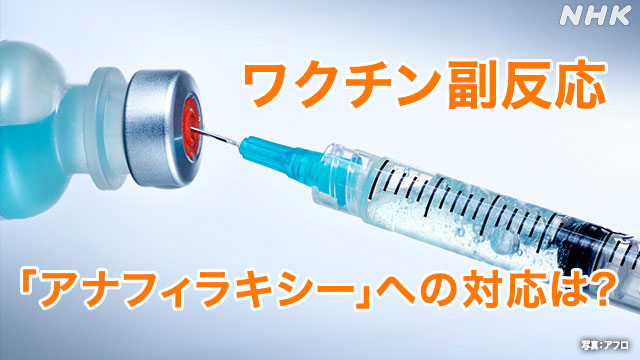It has been reported that a rapid allergic reaction called "anaphylaxis" occurs, although the number is small, overseas, where vaccination has already begun as one of the side reactions of the new coronavirus vaccine.
Experts point out that it is important to prepare for side reactions when inoculating in Japan, as anaphylaxis can be dealt with if it is immediately noticed and treated.
Low blood pressure and impaired consciousness Sudden allergic reaction
Anaphylaxis is a sudden allergic reaction that can cause shock symptoms such as low blood pressure and impaired consciousness, which can be fatal if not treated properly.
According to Professor Kenji Okada of Fukuoka Nursing University, who is the chairman of the Japanese Society of Vaccines, anaphylaxis is rare in vaccines for other diseases, and vaccines for the new coronavirus may be more frequent than that. is.
However, anaphylaxis can be recovered by finding it early and taking appropriate measures such as injecting first aid, so if you have a well-established system for side reactions, there is no risk of serious consequences.
For vaccination of the new coronavirus in Japan, Professor Okada said, "It seems that there are not many doctors and staff who have actually seen anaphylaxis caused by vaccines, so to move immediately in the field. I would like them to receive training such as simulations and to get them to know how to respond to the actual vaccination. "
Detailed information on side reactions released in the United States
In the United States, where vaccination against the new coronavirus has begun, the CDC = Centers for Disease Control and Prevention has released detailed information on the status of side reactions.
Of these, the vaccine developed by Pfizer, a major US pharmaceutical company, had anaphylaxis symptoms in 21 of the approximately 1.9 million people who received the first vaccination in the United States by December 23, last year.
The time from inoculation to the onset of symptoms ranged from two minutes to two and a half hours, but 70% was within 15 minutes.
Also, 17 of them usually had some kind of allergy.
Another report said that by the 10th of this month, about 4 million people had been vaccinated for the first dose of the American pharmaceutical company Moderna's vaccine, and 10 of them had symptoms of anaphylaxis.
Most of the time between vaccination and the onset of symptoms is less than 15 minutes, and 9 out of 10 people originally had some allergies.
Everyone who knows the course of any vaccine has recovered.
In a report, the CDC said that vaccines rarely cause anaphylaxis, saying, "Anaphylaxis can be life-threatening and requires immediate treatment. Vaccination sites receive" epinephrine ". We need the necessary equipment and trained staff to be able to do it. We should explain to vaccinated people that they should receive medical care immediately if there are any signs of allergic symptoms, even after leaving the venue. " is.
In the United States, the CDC, together with the FDA = Food and Drug Administration, operates a website called "VAERS" that reports changes and symptoms of physical condition after vaccination regarding side reactions of vaccines.
If many people are vaccinated with the vaccine, various symptoms will be reported even if it is not a side reaction, so it is necessary to investigate the causal relationship with the vaccine in more detail, but we have learned by collecting a lot of information. It means that you may find side reactions that have not been done.
The information can be confirmed by anyone.
Doctors with treatment experience "It is important to quickly identify symptoms"
Doctors who have treated children who have had anaphylaxis symptoms from vaccination in the past say that advance preparation is important.
Dr. Akiko Miyata, who has a clinic in Tokyo, experienced symptoms of anaphylaxis when she vaccinated a boy with the flu vaccine in 2014.
At that time, urticaria began to appear about 30 minutes after the inoculation, and after that, respiratory symptoms such as coughing and breathing painfully with "seesee" appeared, so it was moderate. It means that he was diagnosed with anaphylaxis.
Immediately, he was given a drug called "epinephrine" to suppress the symptoms and was transported to the emergency room, which means that the boy became well after that.
Since many people come to get vaccinated at Dr. Miyata's clinic, we usually prepare a checklist of symptoms for anaphylaxis and necessary medicines, as well as equipment for oxygen inhalation just in case. It means that we check every week.
Dr. Miyata said, "I think it is most important to quickly identify the symptoms and start treatment at that stage if there is a suspicion of anaphylaxis. Not limited to the new coronavirus vaccine, what is the safe way to inoculate the vaccine? It's important to be prepared in case something goes wrong. "
Not only vaccine side reactions but also "vaccination stress related reactions"
When vaccination is given, not only side reactions of the vaccine but also anxiety and stress about injections and vaccination may cause symptoms such as hyperventilation and dizziness. WHO = World Health Organization Will issue a manual in 2019, asking healthcare professionals involved in vaccination to respond without overlooking.
According to this, due to factors such as fear of the injection needle itself, pain when the needle is pointed, and concern about the vaccine, the heart beats violently before and after inoculation, shortness of breath and dizziness. It is said that overbreathing may occur, and in some cases, even a few days after vaccination, the swelling and pain after vaccination do not easily subside, causing anxiety.
These reactions are called ISRR = "vaccination stress-related reactions", and medical staff can actively communicate with the vaccinated person to reduce anxiety, or have them rest in a quiet place. It is said that it is important to have a deep breath.

